Afrofuturefest Returns To New York Comic Con!
When Afrofuturefest made its debut at last year's NYCC they were the nexus where so many blerds came together on that con floor! Comics industry talent like Afua Richardson, Tony…
When Afrofuturefest made its debut at last year's NYCC they were the nexus where so many blerds came together on that con floor! Comics industry talent like Afua Richardson, Tony…
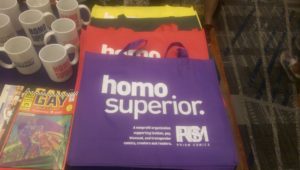
Representation is a funny thing: it’s not a thing you think about at all until the world makes you. The world defines you by the incidental parts of your existence, the things you could not choose about who you are. You define yourself by what you love, what loves you back, what moves you and what you move in turn. Ultimately, you know what you are and you know what you are not, and if you look around you can see evidence that you are not alone, that who you are and what you love exist within the world in which you live.
Now imagine if that wasn’t true.
As human beings, part of how we know things are possible is we see them happen. It’s the literal job description of a “role model”. We see someone like us climb a mountain or run for President and it’s a signal to the rest of us that maybewe can do it to but imagine whenever you read your favorite books or go to the latest blockbuster, there isn’t anyone that bears any resemblance to you doing anything amazing ever. Maybe you love kung fu flicks. You watch them all the time and you’d love to do kung fu but in all the movies you’ve ever seen there is never anyone who moves or speaks or acts or looks like you. How do you then ever imagine yourself ever doing kung fu or even taking a kung fu class? Maybe you love art but in every gallery and museum you’ve ever seen, no one who looks like you or thinks about art the way you do has ever been portrayed in a work on exhibit anywhere. How do you then come to believe that the world of art has a place for you?
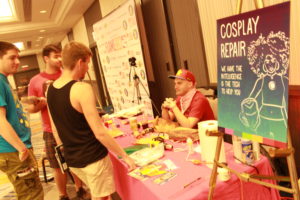
The reality is people don’t often go places where they don’t see themselves, whether it’s schools, neighborhoods, or careers. If everything in the world is telling you that the things you couldn’t choose about who you are, that what you love and what loves you back, that what moves you and what you move in turn is not found in the world as it is and as such has no place in the world, how do you find the peace that comes from the certainty that you are not alone and that who you are and what you love exist within the world in which you live? The answer is an age-old one: if people are not making room for you, not allowing you the space to be represented as a part of the word in which you live, then unapologetically and definitively, you make room.
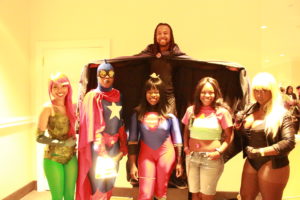
Such is the defiant flag of starshine-glitter and rainbow brilliance that flew over Flame Con 2016 aka “FLAME CON 2: 2 FIERCE 2 FABULOUS”. Flame Con is a pop culture convention that focuses on representing and celebrating the Lesbian, Gay, Bisexual, Transgender, Questioning, and Queer communities and their place in the mediums of comics, cosplay, manga and general geek culture. This year the Con moved out of the ironically luxurious NYC staple The Grand Prospect Hall and into the Brooklyn Bridge Marriott, bringing with it an even greater sense of legitimacy and the added bonus of seeing the faces of the unsuspecting hotel guests as large groups of gender fluid cosplayers and hardcore lady nerds moved around and through their otherwise vanilla weekend in New York City.
Flame Con was hosted by GEEKS Out, a non-profit organization created in 2010 to give the LGBTQ community representation and a home at New York Comic Con. Having started out as one booth at NYCC, Flame Con in its second year exists as a statement that it is not enough to just have a quiet corner seat at the white male, hetero-normative table. The diverse and talented population of the Queer community deserves and most importantly is able to support their own table. This sentiment is reflected in the views of the various vendors, artists, and cosplayers present. Jenny Cunningham and Sam Kirk, creators of Quirklyn and Provoke Culture respectively, spoke with me about the struggles of finding a place within nerd culture not only as lesbians but as women of afro-latina/hispanic heritage. Jenny Cunningham, who is in the process of producing a web comic showing the world through her own unique lens, spoke about her history with 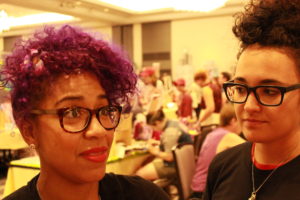 nerd culture:
nerd culture:
“I’ve been aware that there wasn’t a place for me in nerd culture my whole life. Whether it was because I was a woman or because I had leanings towards sexuality that weren’t cis normalized identities, I had messages all around me in mainstream media about what beauty looks like and I didn’t look like any of those images. In comic books that I read, I wanted to save the day too but there was no one who looked like me or my family or my friends who be saving the day [in comics].”
Standing beside her booth adorned with a large black banner with the words ‘The Lesbians are Coming’ emblazoned across it, Sam Kirk reflected on her projects and their ultimate aim:
“[With our work] we focus on saying, we do exist, we are here, we do matter.” The core notions of not only representation, but community outreach and support were at the heart of every piece of art and every organization on the Con floor.
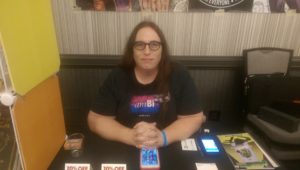
Tara Avery of Prism Comics, a non-profit all-volunteer organization supporting LGBTQIA (Questioning, Intersex and Asexual)-friendly comic books, comics professionals, readers, and educators spoke with me about her organization’s “Queer Press Grant”, a $2000 grant awarded each spring to help an independent comics creator publish their work of interest to an LGBTQIA audience. “Sometimes you’re not really aware of how much representation matters until it’s you being represented after not being represented for so long.” One of Prism Comic’s aims with the Queer Press Grant is to get creators to reach out to people who may not even know they are being underrepresented and help some of the most marginalized among us see our place in the world.
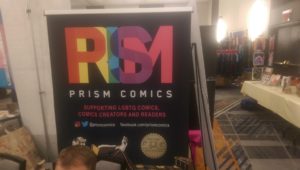
“That’s one of main motivations…when you’re misrepresented it hurts but when you’re not represented at all and suddenly you find somebody they say ‘hey this is a book about a transgender character, this a book about a bisexual character’ when you think you were the only one who was like that, it can make all the difference in the world,” Avery explained.
More than any other ideological focus, the call of the convention was for its attendees to be the next generation of queer creators, to pick up their pens and sketchbooks and laptops and flood the culture with the voices of thousands of LGBTQ perspectives. Creators such as Steve Orlando, writer of Virgil for Image Comics as well as Batman, Supergirl, and Midnighter for DC, feel that what the Queer community needs is as many creator voices joining the chorus, adding their art to the collective consciousness:
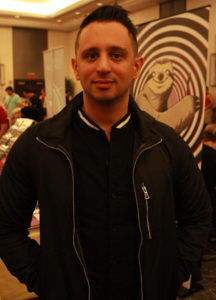 “I think the biggest struggle is about volume in many ways. A book like Virgil or Midnighter, you can do them and your responsibility is to do something true and respectful of that person but when it comes to representation, there are as many faces in the Queer community…as the mainstream community, so you can’t do it all with one book. I think the inclination from corporate is ‘Oh you got a book now, the fight’s over.’ No, the fight has just begun because if you try to do everything with that one book then it will come off as pandering. The goal is to do holistic, 3-D representations and when you’re doing that the goal after that is to do more.”
“I think the biggest struggle is about volume in many ways. A book like Virgil or Midnighter, you can do them and your responsibility is to do something true and respectful of that person but when it comes to representation, there are as many faces in the Queer community…as the mainstream community, so you can’t do it all with one book. I think the inclination from corporate is ‘Oh you got a book now, the fight’s over.’ No, the fight has just begun because if you try to do everything with that one book then it will come off as pandering. The goal is to do holistic, 3-D representations and when you’re doing that the goal after that is to do more.”
Equal parts affinity play space and defiant act of independence, Flame Con strikes a perfect balance between self-expression, social justice, and superheroes. The attendees and the presenters stood united in a perfect notion of revolt from the mainstream. In a time when the mainstream has swallowed outcast, nerd and geek culture into its maw, making its stories into bubble gum shadow of what it had been, all for mass market edification, the last frontiers of individuality become the taboos that America still can’t stomach: Race, Gender and Sexuality. It’s in these niches where nerd culture remains pure, because despite every movie being of a superhero and so many shows being comic-inspired, if you are not straight and white and a dude, then odds are you don’t see anyone like you saving the day and you’re still the outcast.
That also mean that the marginalized are the last true nerds, still out on the fringes making the avant-garde art that shapes the world for everyone not born different enough to be original; telling the tales that change perspectives and not just reinforce them; being special in a world that has lost the meaning of the word to mass production. Flame Con reminds the rest of nerd-dom that representation matters more than mainstream acceptance, and in doing so, remains truer to its background, its history and its fans than any con in recent memory.
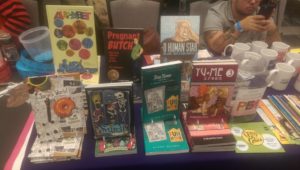
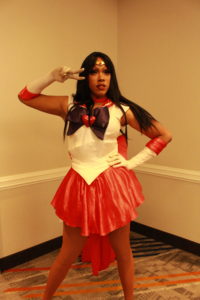
All Photo Credits: Kaos Blac
If you were in attendance today at San Diego Comic Con then you wanted to be at the famed Hall H for all of the Justice League excitement! We not…